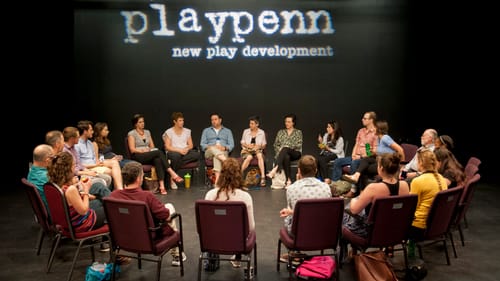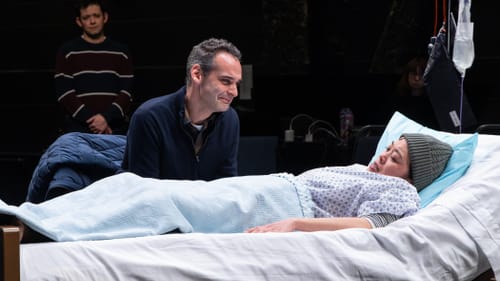Stay in the Loop
BSR publishes on a weekly schedule, with an email newsletter every Wednesday and Thursday morning. There’s no paywall, and subscribing is always free.
“We’re all banding together. Otherwise, we’re not going to exist.”
Philly arts organizations speak up after the Trump administration revokes their NEA grants

A $40,000 National Endowment for the Arts (NEA) grant to Philadelphia Young Playwrights promised to pay for a dozen teaching artists to work with 200 public school students, residencies that are about to conclude for the 2024-25 school year.
A $15,000 NEA award was to finance the end-of-year show, including the salary and travel costs for a director from France, for students at Circadium School of Contemporary Circus in Mt. Airy, the country’s only accredited circus college.
Philadelphia Theatre Company was granted $50,000 from the federal arts agency to reimburse some of the costs of producing Night Side Songs, a musical inspired by interviews with doctors, caregivers, and patients dealing with cancer.
Friday night arts massacre
Last Friday night, hours after President Donald Trump released a budget proposal that calls for eliminating the NEA, directors of those arts organizations, along with hundreds of others across the country, received an e-mail from an arts.gov address with a one-word subject line: "Termination."
Those grants were being rescinded, the e-mail said, because, in short, the projects did not fit Trump’s priorities.
“The NEA is updating its grantmaking policy priorities to focus funding on projects that reflect the nation’s rich artistic heritage and creativity as prioritized by the President,” read the e-mail, also sent to Theatre Exile, Quintessence Theatre Group, the Wilma Theater, and numerous other Philadelphia-area theaters, arts agencies, and museums.
It went on: new priorities for NEA funding include projects that “celebrate the 250th anniversary of American independence, foster AI competency … assist with disaster recovery, foster skilled trade jobs, [and] make America healthy again.”
Fears come true
When Che’Rae Adams, artistic director of PlayPenn, read those words, she had a physical reaction. “My stomach sank,” she says. “What I feared became real.”
In anticipation of reduced or cancelled funding, Adams and her staff had already downsized July’s New Play Development Conference, which the grant was supposed to fund, reducing it from four to three resident playwrights whose work will undergo an intensive development process followed by staged readings.
That translates to scotched salaries and opportunities for about six actors, a dramaturg, a director, and a playwright who loses the rare chance to have a play developed.

But for Adams, the loss of NEA funding has a deeper, more alarming effect. “It hit me: how are we ever going to have [federal] support of the arts again? Will there ever be an understanding of how important the arts are? It’s bigger than PlayPenn, and it’s terrifying and heartbreaking and extremely stressful.”
Terrible, but not surprising
Shana Kennedy, executive director of Circadium, wasn’t shocked by the e-mail. Grants to arts organizations from the NEA typically work on a reimbursement basis: the money is promised, the organization spends it on salaries or scenery or travel, then recovers the funds through the NEA’s grant portal.
Kennedy had tried, in recent weeks, to get back some of the funds Circadium had already spent to prepare the end-of-year show, The Garden of Earthly Delights, scheduled to be produced as part of the Philadelphia Contemporary Circus Festival on May 30 and 31. But the NEA’s portal was unresponsive, and the automated messages—“Your grant is not finalized”—were worrisome.
At Quintessence, executive director Erica Ezold had the same experience. Though the theater learned of its $25,000 NEA award last November and signed an agreement the following month, Ezold says, “It’s been in this weird limbo state” with no ability to access the funds.
The money was to pay for two workshops and a full production of Fire!! The Play, a multi-disciplinary work based on a literary magazine that published a single issue in 1926, including work from Black and queer writers and artists.
The grant rescission “feels not surprising, but pretty terrible,” Ezold says. Like Adams at PlayPenn, she thinks about the broader implications of the NEA’s funding shifts: NEA money flows to state arts agencies, which then fund regional and local projects, often “in areas of this country where that’s the only way people can have access to anything related to arts and culture.”
Missing reimbursements
For some of Philadelphia’s arts and culture organizations whose grants were rescinded, there is time to scramble for private funding from individuals, businesses, and foundations, or to scale back to less ambitious versions of productions that are in the works.
But for Philadelphia Theatre Company, the curtain’s already closed on Night Side Songs, the show the NEA grant was supposed to help fund—a $400,000 production that included a free tour to libraries, community centers, and hospitals. “We certainly were counting on the $50,000,” says co-artistic director Tyler Dobrowsky. “It does force us, yet again, to scramble and try to make up the money.”

The NEA, the largest arts funder in the United States, represents a thread of the nation’s budget—about 0.003 percent of federal spending, according to a 2022 fact sheet. For fiscal year 2025, the agency awarded 64 grants, totaling nearly $1.5 million, to art, theater, dance, and education projects across Pennsylvania. Thirty-four of those went to Philadelphia-based groups.
“These cuts are having a chilling effect,” says Patricia Wilson Aden, president and CEO of the Greater Philadelphia Cultural Alliance. “The impact is real. These grants are seen as badges of honor. They signal artistic excellence and financial stability; they leverage other funding opportunities.”
"Keep doing the work."
Directors of nine area theaters gathered around a virtual table Monday morning to talk about the grant rescissions. Some planned to appeal the decision; the NEA’s e-mail noted a seven-day window to do so. Others are sending immediate, desperate appeals to subscribers, donors, and other potential funders.
They talked about protest strategies, collective pushback, and resource-sharing to make their work more sustainable. PlayPenn’s summer conference, for instance, includes seven other arts organizations as partners. “We’re all banding together,” says Adams. “Otherwise, we’re not going to exist.”
At Theatre Exile in South Philadelphia, rehearsals begin today for Glitter in the Glass by R. Eric Thomas, a story about a Black artist trying to create a piece of public art to replace a dismantled Civil War monument; it’s the production that would have been funded by a $25,000 NEA grant.
The play poses the question, “How can the arts help project us into a new time?” says the theater’s producing artistic director, Deborah Block. “It’s incredibly relevant to the conversations we should be having right now.”
At Circadium, Kennedy walked into a high-ceilinged studio on Monday morning and told the 16 circus students that funding for their final production had been pulled. She also told them to keep rehearsing.
“I said, ‘We’re going to try to figure this out.’ Keep doing the work. Keep making art.”
Sign up for our newsletter
All of the week's new articles, all in one place. Sign up for the free weekly BSR newsletters, and don't miss a conversation.

 Anndee Hochman
Anndee Hochman